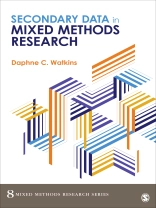Secondary Data in Mixed Methods Research by Daphne C. Watkins, the latest contribution to the Mixed Methods Research Series, offers unique and necessary instruction in this growing topic. With the increasing amount of secondary data available through journals and repositories, researchers have a trove of sources for new investigations at their fingertips, but few books to guide them. This brief text provides readers with a step-by-step procedure for incorporating secondary data into various mixed methods research designs, as well as identifying key characteristics of existing datasets that make them good candidates for mixed methods projects and giving ideas for new uses of secondary data. Introductory chapters help the reader understand the “what” and “why” of secondary data. Subsequent chapters address the use of secondary data in convergent, exploratory sequential, explanatory sequential, and other complex research designs. The final chapters delve into writing and reporting on projects before, during, and after the project. Quotes throughout the chapter help readers remember key bits of knowledge, while learning objectives and summaries in each chapter structure the reading experience. Application questions at the end of each chapter help readers recall information and apply it to their own research projects. By emphasizing how to use existing qualitative and quantitative datasets in mixed methods research,
Secondary Data in Mixed Methods Research will help readers answer new and ongoing questions in social science research.
Tabla de materias
Series Editors’ Introduction
Preface
How This Book Came to Be
Necessity Is the Mother of Invention
What This Book Covers
How Readers Can Use This Book
Audiences for This Book
Pedagogical Features
Structure of the Book
Acknowledgments
List of Figures, Tables, and Case Studies
About the Author
PART I • AN INTRODUCTION TO SECONDARY DATA IN MIXED METHODS RESEARCH
Chapter 1 • The Science of Secondary Data
Imagine
The Science of Secondary Data
The Epistemology of Secondary Data
Types of Secondary Data
Scientific Developments With Secondary Data
Chapter 2 • Using Secondary Data in Mixed Methods
Imagine
The Knowledge-Level Continuum as a Roadmap for Mixed Methods
What Is Required to Do Mixed Methods With Secondary Data?
Secondary Data in Mixed Methods: Three Reasons Why
Examples for How Mixed Methods Could Benefit From Secondary Data
Mixed Methods Solo, Semi-Solo, and With a Team
Chapter 3 • Evaluating Secondary Data for Mixed Methods
Imagine
The Life Cycle of Research Data and a Place for Secondary Data
Three Considerations When Selecting Secondary Qualitative and Quantitative Data
Ten Questions When Evaluating a Secondary Qualitative or Quantitative Data Source
Applying the Ten Questions to Secondary Data
PART II • DESIGNING AND CONDUCTING MIXED METHODS WITH SECONDARY DATA
Chapter 4 • Convergent Design With Secondary Data
Imagine
Features of the Convergent Design
Bringing Secondary Data Into the Convergent Design
Planning and Implementing a Convergent Design With Secondary Data
Challenges (and Solutions) When Using Secondary Data in the Convergent Design
Chapter 5 • Exploratory Sequential Design With Secondary Data
Imagine
Features of the Exploratory Sequential Design
Bringing Secondary Data Into the Exploratory Sequential Design
Planning and Implementing an Exploratory Sequential Design With Secondary Data
Challenges (and Solutions) When Using Secondary Data in the Exploratory Sequential Design
Chapter 6 • Explanatory Sequential Design With Secondary Data
Imagine
Features of an Explanatory Sequential Design
Bringing Secondary Data Into the Explanatory Sequential Design
Planning and Implementing an Explanatory Sequential Design With Secondary Data
Challenges (and Solutions) When Using Secondary Data in the Explanatory Sequential Design
Chapter 7 • Complex Applications of the Core Designs With Secondary Data
Imagine
Features of a Complex Design
Bringing Secondary Data Into Complex Designs
Case Studies of Complex Mixed Methods Designs With Secondary Data
Challenge (and Solution) When Using Secondary Data in Complex Designs
PART III • WRITING MIXED METHODS WITH SECONDARY DATA: BEFORE, DURING, AND AFTER
Chapter 8 • Early-Stage and Active Project Writing for Mixed Methods With Secondary Data
Imagine
Early-Stage and Active Project Writing: Defined
Examples of Early-Stage Writing
Examples of Active Project Writing
Tips to Maximize Early-Stage and Active Project Writing
Chapter 9 • Reporting Mixed Methods With Secondary Data
Imagine
Reporting Mixed Methods With Secondary Data
Project Deliverables for Mixed Methods With Secondary Data
Challenges When Reporting Mixed Methods With Secondary Data
Tips for Reporting Mixed Methods With Secondary Data
Glossary
References
Sobre el autor
Daphne C. Watkins is a professor of social work and a University Diversity and Social Transformation Professor at the University of Michigan. She became interested in mixed methods research during her quest to uncover the “voices behind the numbers” as a doctoral student. Professor Watkins has taught research methods to health and human service professionals for more than two decades. After noticing the lack of post-graduate research training, Professor Watkins developed the first Certificate Program in Mixed Methods Research at the University of Michigan School of Social Work. The certificate program — designed for researchers and practitioners interested in doing mixed methods research in practice settings — was the motivation behind her first book Mixed Methods Research (2015, Oxford University Press) for the Pocket Guides to Social Work Research Methods Series. In addition to developing culturally-appropriate strategies for conducting mixed methods, Professor Watkins developed the Rigorous and Accelerated Data Reduction (RADa R) technique, an individual and team-based approach to organizing, coding, and analyzing qualitative data. Professor Watkins is particularly interested in using secondary data in mixed methods research and has been awarded grants that address health disparities and achieve health equity. Professor Watkins is the founding director of the Gender and Health Research (Gend HR) Lab and the award-winning Young Black Men, Masculinities, and Mental Health (YBMen) Project, which leverages technology to provide mental health education and social support for young Black men. She currently directs the Vivian A. and James L. Curtis Center for Health Equity Research and Training at the University of Michigan.












